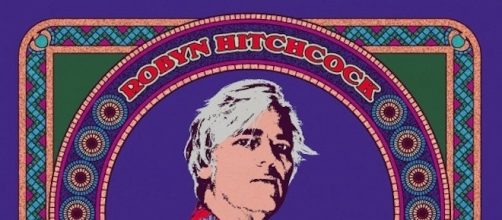The new self-titled Robyn Hitchcock album is everything you’d hope it would be. Twenty-plus albums and forty-plus years into his career, and with both feet firmly planted in the present, Hitchcock effortlessly rocks across the decades with a sharp-eyed, yet somewhat elusive and surreal, look at the British environment that shaped the artist as a young man.
“Robyn Hitchcock” was recorded in Nashville, where Hitchcock recently relocated, but it’s no “Nashville Skyline” or “Almost Blue.” The cover art accurately captures the feel of the album - a recent photograph of the white-haired cult figure holding his dear, departed kitty, Tiny Montgomery, both encased in a psychedelic setting.
Loosely modeled after his first masterpiece, 1980’s “Underwater Moonlight” with his band the Soft Boys, the basic two-guitars-bass-drums-harmonies line-up dresses Hitchcock’s ten songs here in 1960s beads and nehru jackets. In recent interviews, Hitchcock has often mentioned his new reassessment that it was 1966, not his beloved 1967, that really was the most inventive and exciting year in all of pop music, and that groovy vibe permeates the album, although the scope encompasses more than just that one trip around the sun.
Listening to “Robyn Hitchcock” is like devouring a multi-layered birthday cake. You can sort of make out what the ingredients are, yet each bite melds the individual flavors together as one with each delicious gulp.
You might occasionally recognize a riff from, say, The Beatles’ “Revolver,” but these are only sprinkles added to enhance the flavor that’s already there. The songs and the arrangements remain pure, unadulterated Hitchcock.
Production
The production by the Raconteurs’ Brendan Benson is the icing on the cake. One only has to seek out a live solo version of “I Pray When I’m Drunk,” or the stripped down versions of “Sayonara Judge” and “Raymond and the Wires,” which Hitchcock has posted online, to hear what Benson brought to the table - glistening guitars, pedal steel, and backwards tapes, subtle strings and ethereal voices, as much the Byrds’ “Sweetheart of the Rodeo” as “Sgt.
Pepper,” extra ingredients added to the proceedings without bringing any additional attention to them. The end result is that the entire album sounds current, or more accurately, timeless.
Like most psychedelic pop, Hitchcock’s songs are rarely linear. Yet, there is a unified feeling on the album of lapsed optimism, a trip back to a fictional, utopian mountaintop before things decayed into violence, hard drugs, and self indulgence.
While “Underwater Moonlight’s” vicious yet still relevant opening track, “I Wanna Destroy You,” cast a “pox upon the media,” “Robyn Hitchcock” begins with a more polite and mature manifesto, “I Want To Tell You About What I Want.” A sort of skewered take on hippie idealism, “I Want To Tell You” imagines a dystopian future overtaken by artificial intelligence and a “feline dynasty.”
Time
Yet while Hitchcock’s trip backwards is often a groovy one, the passage of time, and the loss of innocence, can be felt waiting in the shadows. The rocking “Mad Shelley’s Letterbox” begins, “Time is written on your face/And the cold white arms of memory embrace you.” The country-tinged “1970 is Aspic” marks the symbolic end of the 1960s, while the lighter side of death, a favorite subject of Hitchcock’s, shows up in a jaunty, matter-of-fact “Virginia Woolf.”
“Raymond and the Wires,” perhaps Hitchcock’s most personal and revealing song, recaptures a day out with his father in 1964, with young Robyn unable to ride the upper deck of his beloved trolley bus because Raymond, whose leg was injured in the war, was unable to climb the stairs.
(The embedded video includes footage of a young Robyn, his father, and his sister Fleur.) The album ends with “Time Coast,” where Hitchcock is safely back in the amniotic fluid of the womb, where it all began.
Although he has gleefully documented his doomed view of humankind for decades, Hitchcock has never appeared to be more personally content than he is now. So many years down the road, unlike many of his peers, he’s still on top of his game. To cite one of his greatest influences, he was so much older then, he’s younger than that now.
Paul McCartney should be force fed this album.
“Robyn Hitchcock” by Robyn Hitchcock, Yep Roc Records, out Friday, April 21.

